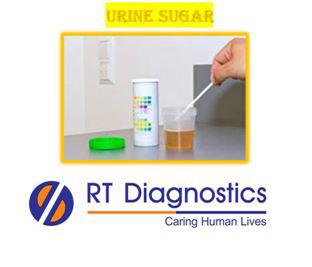URINE SUGAR (F):
Urine sugar (F) is fasting urine Sugar to determine the Glucose level in the urine which is taken after the overnight fasting. Sugar (Glucose) is responsible for energy in our body. If glucose level elevated in the blood, it would be eliminated through urine. The excess glucose level in the urine is a sign of the diabetic condition.
CLINICAL INFORMATION :
Normally this hormone insulin helps to glucose entry from the bloodstream into the cells. In uncontrolled diabetic patients when glucose levels reach high levels beyond threshold levels (in normal levels glucose is usually reabsorbed by kidneys), it is excreted in the urine (glucosuria), hence can be tested by urine glucose test. This test helps to diagnose diabetes and also to manage their condition to prevent further complications (such as diabetic ketoacidosis due to uncontrolled diabetes mellitus).
This test is usually done for the medical diagnosis of certain abnormalities such as pancreatitis, pancreatic cancers, and an underactive thyroid. Low levels of glucose also indicate self-administration of overuse of insulin dose, starvation, Addison’s disease, insulinoma, kidney diseases, etc. This test is suggested in patients with symptoms such as increased thirst, frequent urination, fatigue, shortness of breath, stomach pain, fruity breath odor, dry mouth, nausea, and vomiting, etc. Other associated tests include Benedict’s test, Fehling’s test, etc.

General instructions:
Sample Requirement: Urine Specimen. Test Preparation: Overnight fasting.
NOTE - Sample for specimen collections may vary based on the patient’s condition/cases according to the patient’s presenting complaints/signs or symptoms:
SPECIMEN REQUIREMENT (Special or Rare Cases) - As instructed and guided by Physician / Clinician / Pathologist / as per Laboratory’s requirements, according to procedures and protocols.
This Multi-Specialty Clinical Referral Laboratory “RTDIAGNOSTICS” provides precise and accurate tests with an extensive range of testing services to the medical centers to help in the diagnosis and identification of pathology in the test specimens for infectious diseases and also to evaluate the function of organ systems of the patient. It prevents further complications and helps to stabilize and restore health to near normalcy at the earliest without delay.



